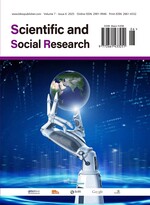Analysis of Quantity and Weight Discrepancies in the Split Discharge of Imported Bulk Cargo at Two Ports in Shanghai, and Research on the Intelligent Application of Quantity and Weight Identification
Abstract
This paper focuses on the prevalent issue of quantity and weight discrepancies that arise during the split discharge process at two ports after the import of iron ore at Shanghai port. Through the analysis of historical data from over 100 batches of imported iron ore, this study systematically reveals the multiple complex factors that contribute to these discrepancies. These factors include the inherent physicochemical properties of the cargo, environmental and operational impacts during transportation, and potential commercial fraud. Based on a thorough examination of the causes, this paper proposes a systematic response strategy involving multiple dimensions such as the intelligent identification of quantity and weight, optimization of operational procedures, harmonization of international standards, improvement of trade contract terms, and strengthening of regulatory cooperation. The aim is to provide decision-making references for enterprises involved in bulk cargo trade to effectively avoid risks and protect economic interests, while also offering valuable theoretical support and practical suggestions for relevant regulatory authorities to improve the inspection and supervision system for bulk cargo.
References
Zhang QY, 2025, Research on the Application of Intelligent Monitoring Systems in Port Safety Management. Water Safety, 2025(6): 172–174.
Tu S, Shi HK, 2025, Accelerating the Research and Application of Vehicle Autonomous Driving Technology in the Port Sector. China Ports, 2025(1): 23–26.
Han ZY, 2024, Discussion on the Intelligent Application of Port Grain Storage. Modern Food, 30(20): 5–11 + 121.
Chen JF, Zhong WJ, Wang T, et al., 2024, Inspection Methods and Research Applications for Remote and Automatic Control Systems of Intelligent Port Cranes. Construction Machinery Technology and Management, 37(5): 57–60.
Wang X, 2024, Research and Application of Optimization Algorithms for Intelligent Port Coal Yard Scheduling Systems. Software, 45(7): 80–82.
Li QZ, Zhao ZY, 2023, Research on an Intelligent Management System for Hot Work Operations Involving Hazardous Goods at Ports. Transport Manager World, 2023(29): 164–166.
Wang SJ, 2023, Research on Ship Intelligent Management System Based on Internet of Things Technology. Pearl River Water Transport, 2023(15): 88–90.
Huang ZZ, Xu MC, 2021, Prospects and Applications of Intelligence in Oil and Gas Chemical Terminals. Labor Protection, 2021(2): 91–93.

